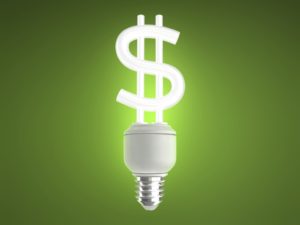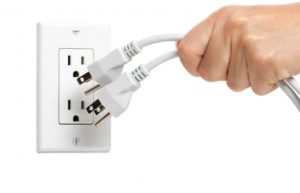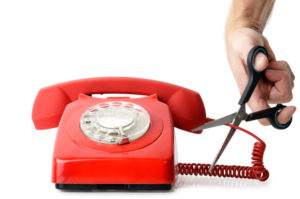Everyone has monthly bills that must be paid, and while most of it is for products and services that can’t be eliminated, the associated costs can often be lowered. It’s time to sit down, look over your finances and figure out how to save money. Decide which bills you can not avoid and which can be reduced. Sometimes small numbers can add up to a big sum. Check out our list of practical ways to save money on your bills every month.
Watch the video here:
Bills to Review to Save Money Monthly
Utility Bills
There are some really easy ways to save on your energy bills without cutting off the power to your house. Energy efficiency technology has improved tremendously in the last few years—using innovative techniques and upgrading your home to new better energy efficient products can help reduce your spending on monthly energy bills for years to come.
Light Bulbs
 The light bulb isle at your local home improvement store can be a great place to start saving. Choose LEDs or CFLs over traditional bulbs to lower your daily watt usage and your electricity bill. These light bulbs typically last 10x longer and consume less energy than regular bulbs.
The light bulb isle at your local home improvement store can be a great place to start saving. Choose LEDs or CFLs over traditional bulbs to lower your daily watt usage and your electricity bill. These light bulbs typically last 10x longer and consume less energy than regular bulbs.
A great tip to buying new bulbs: Use the lumens number to compare bulbs, not the equivalent wattage. Lumens show the actual amount of light the bulb will put out. Switching out just the most used lights in your house will lower your bills noticeably.
Smart Thermostat
Heating and cooling your home is a huge expense, but we would be very uncomfortable without this luxury. Investing into a programmable thermostat can help cut costs, especially during times when no one is at home.
During summer months, you can raise the temperature when you are at work, asleep or on vacation and don’t need the climate quite as cool. You can also set it to start cooling before you return home for a comfortable temperature upon arrival.
The Nest Learning Thermostat goes a step further by learning your daily routines and programming itself to lower or raise the temperature as needed. This initial $200 investment will pay for itself in less than two years.
Unplug Electrical Devices
 All plugged in devices constantly use electricity, even when not in use—leading to a phantom charge that increases your bill. The most obvious thing to do is unplug the devices that don’t get frequent use.
All plugged in devices constantly use electricity, even when not in use—leading to a phantom charge that increases your bill. The most obvious thing to do is unplug the devices that don’t get frequent use.
While this is simple with hair dryers and irons, realistically there are still many electronic items that stay plugged in at all times. Power strips and timers can help alleviate some of the phantom charges from accumulating. Power strips have a single on/off switch so you can easily turn off multiple devices without having to flip multiple switches—really who has time for that.
Timers can be even more effective, as you can set them to automatically turn off at night or while you’re on vacation, thus cutting all electricity to anything plugged in.
Purchasing a smart plug can provide a great return on investment in electricity costs!
Turn Down the Hot Water Heater
Lowering the temperature on your hot water heater by just 10% can result in an average 14% reduction in energy costs. Most people’s hot water heaters are set much higher than is needed or used inside the home. This will be a small change most home-owners won’t notice until their bill arrives.
Water heater blankets are another option to keep the heat from escaping out of your water heater and reducing the amount of energy lost. Insulating your water heater will play for itself within a year. You can also check with your local utility company to see if they offer any incentives or rebates for water heater blankets.
Seal Your Home
 Both warm and cold air can escape out of windows and doors, which can increase your bill substantially as you pay more to keep the temperature comfortable inside. Weather stripping and caulking windows and doors is the first step to guarding against drafts. The U.S. Department of Energy offers a complete guide if you really want to tackle this issue and lower your bills.
Both warm and cold air can escape out of windows and doors, which can increase your bill substantially as you pay more to keep the temperature comfortable inside. Weather stripping and caulking windows and doors is the first step to guarding against drafts. The U.S. Department of Energy offers a complete guide if you really want to tackle this issue and lower your bills.
Check your Meter
Comparing the numbers on your utility bill to the actual read-out on your meter is important to do from time to time. If the meter shows a lower amount, you may be being overcharged. If that is the case, contact your utility company right away to fix the issue.
Check with your State
Many state governments offer discounts, tax credits and incentives to homeowners who want to install more energy efficient home solutions. Check with your local state government to see if anything is available in your area.
Cut the Cable Bill
Cable can be a huge monthly expense, so it’s time to reevaluate how much TV you are actually watching. With new streaming services available, many people are turning away from expensive monthly cable packages in favor of cheaper streaming services. Make sure to focus on the ones that you will watch the most.
You can also downgrade to a lower package or ask about any savings available from your service provider if you do love your cable TV and don’t want to switch completely.
Reconsider Your Phone Needs
 If you have both a landline and cell phone, consider whether getting rid of the landline makes sense. Even if you choose to keep the landline for emergencies, taking a close look at the bill can save you a few bucks every month. By eliminating services that you don’t use, such as call waiting, caller ID and even long distance calling, you can reduce your bill. Each service can add a line item to the total, so being conscious of the services you have, use and pay for is important.
If you have both a landline and cell phone, consider whether getting rid of the landline makes sense. Even if you choose to keep the landline for emergencies, taking a close look at the bill can save you a few bucks every month. By eliminating services that you don’t use, such as call waiting, caller ID and even long distance calling, you can reduce your bill. Each service can add a line item to the total, so being conscious of the services you have, use and pay for is important.
You can also consider switching to a Voice over Internet Provider (VoIP), which often charges a flat fee. Skype calling can also be an effective communication tool that is completely free of charge.
Many cell phone plans tend to have a lot of extra charges you may not be using, but are still paying for. Check your data to see how much you are using monthly—maybe you can reduce your plan. Also calling the carrier and asking for a better deal or plan can be an effective way to lower that bill.
Bundle Your Service
Often, bundling services such as phone, TV and internet can lower your monthly bill on all three. Check with your local carrier to see if they offer discounts or deals to bundle your communication needs.
Refinance Your Debt
Most people have some sort of debt they are paying off, whether it be a mortgage, college loans or credit card debt. These all can equal up to a large percentage of your monthly expenses; lowering some of these can help lighten the burden every month and help you save.
 Getting a lower interest rate on your home mortgage can have a huge impact on your monthly payments. If you bought your home a long time ago, it may be a good idea to look into your refinancing options. It is very important to comparison shop and read the fine print, such as closing costs, to determine if this is the right option for you. You can also ask about refinancing your automobile while you’re at it.
Getting a lower interest rate on your home mortgage can have a huge impact on your monthly payments. If you bought your home a long time ago, it may be a good idea to look into your refinancing options. It is very important to comparison shop and read the fine print, such as closing costs, to determine if this is the right option for you. You can also ask about refinancing your automobile while you’re at it.
Consolidate Student Loans
If you are paying off several different loans at once, inquire about consolidating them. If you can get a great rate, your average monthly bill can be greatly affected.
Setting up auto-payments for school loans can also save you some cash. Many installment plans will offer you an interest rate reduction if you choose to go this route, which can result in lower payments right away.
Balance Transfer Credit Cards
If you are trying to pay off debt on a credit card, it’s time to look into opening a credit card with a 0% balance transfer rate. Many credit card companies are offering great incentives to open a new card and switch. Even if the 0% interest rate is temporary, you can save a ton of money not paying interest rates and get out of debt faster.
Get Quotes for Homeowners and Auto Insurance
 While having multiple insurance policies—home, car, health, life—is extremely important and can be life-saving in emergencies, you need to make sure that you are not overpaying for these services.
While having multiple insurance policies—home, car, health, life—is extremely important and can be life-saving in emergencies, you need to make sure that you are not overpaying for these services.
Both homeowners and auto insurance companies try to compete for business by offering customers the best rates. If you have been with your company for a while, try to shop around for quotes to see if you can get a better rate. If you have good credit, you really might be able to find a great new deal.
Most companies will give you an even better deal if you bundle home and auto. If you are using two different companies, ask about bundling your policies to reduce your monthly rate.
Look into Term Life Insurance
It’s important to understand the different types of life insurance plans out there, and pick the best one for you. Term life insurance can be a much cheaper monthly option than whole life plans. Term coverage typically ends when an individual retires, presuming their family is no longer dependent on them for financial support. Shopping around for life insurance policies can also be cost effective.
Lowering your monthly bills can be one of the best ways to save money. Investing some time and money upfront can results in lower monthly bills for years. Using these money saving tips can add up big.
For more tips on how you can live a more financially secure life, visit savemoneytricks.com.

























